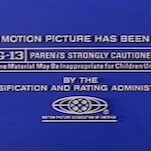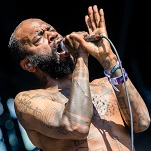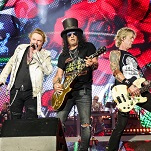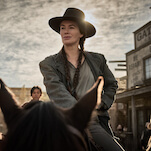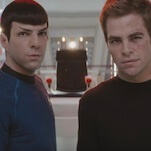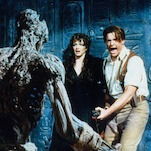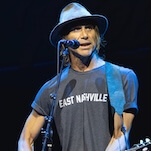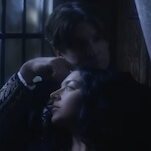Of Tyler, The Creator’s many contradictions, none occupies him more than his relationship with fame. His 2009 Internet album, Bastard, introduced an exceptionally talented teenage rapper who laced his confessional rhymes with crude rape jokes and homophobia, as if to chase away delicate listeners who couldn’t relate to his deep emotional wounds and indiscriminate adolescent rage. A less generous read is that Tyler calculated his vitriol would be catnip to the press, and banked that the controversy over his shocking lyrics would elevate him to the spotlight. It’s doubtful even he knows which is truer at this point. Tyler has always been torn between wanting an audience and wanting to tell the world to fuck off.
Having captured the public’s attention by 2011, Tyler wasted no time wearing out his welcome, testing the loyalty and patience of even his most ardent defenders with his trolling Twitter feed and his difficult commercial debut, Goblin, a frequently riveting, but just as frequently off-putting 70-minute trip through his tortured psyche. Perhaps realizing that he’d pushed his misanthropic lost-teen routine to the limits of public interest, the rapper began promising change in recent interviews, insisting he’d grown up and that his new album, Wolf, would reflect that maturity.
So does the record introduce a kinder, gentler Tyler? At this point it shouldn’t surprise anyone that the rapper can’t be taken entirely at his word. He’s cut out the rape cracks, but he’s still preoccupied with the fervor over his earlier lyrics. He still rhymes in Eminem-patterned smack talk, lobbing pot shots at 2 Chainz, Adele, and the late Whitney Houston; still demands that women suck his dick; and still brandishes the word “fag” like it’s his constitutional right (his friendship with Frank Ocean being the newly relevant clause). After three albums of unfiltered angst, the one-time wildcard now seems like a stubbornly static figure, an impression that’s supported by his monochromatic self-production on all of Wolf’s 18 tracks, which rarely build on the synthesized strings and tranquilized pianos of his other releases.
Tyler saves his best performance for the album’s most troubling song. On “Colossus,” he’s accosted at Six Flags by an overzealous fan who confides his increasingly deranged obsession to his idol. Tyler narrates the account in vivid detail, voicing his stalker in a breathless stream of internal rhyme that grows tenser by the bar. But rather than closing with a shocking final reveal, the song finishes with Tyler begrudgingly consenting to have his picture snapped, grumbling all the while that he just wants to ride a rollercoaster. The admirer isn’t a threatening lunatic after all, but rather just an awkward kid. Nonetheless, the rapper frames having to spend a few moments with an appreciative fan as the ultimate indignity. Tyler has penned dozens of verses that were more shocking, offensive, and inappropriate, but as an artist who built his career around solidarity with troubled outsiders, he’s never written one as cynical.

